
Domenico Ghirlandaio Painting Reproductions 1 of 1
1449-1494
Italian Early Renaissance Painter
Domenico Ghirlandaio (1449 - January 11, 1494) was a Florentine Renaissance painter, a contemporary of Botticelli and Filippino Lippi. His many apprentices included Michelangelo.
His full name is given as Domenico di Tommaso Curradi di Doffo Bigordi; it appears, therefore, that his father's surname was Curradi and his grandfather's Bigordi. Domenico, the eldest of eight children, was at first apprenticed to a jeweller or a goldsmith, most likely his own father. The nickname "Il Ghirlandaio" (garland-maker) came to Domenico from his father, a goldsmith who was renowned for creating the metallic garland-like necklaces worn by Florentine women. In his father's shop, Domenico is said to have made portraits of the passers-by, and he was eventually apprenticed to Alessio Baldovinetti to study painting and mosaic.
First works in Florence and Rome
In 1480, Ghirlandaio painted the Saint Jerome and other frescoes in the church of the Ognissanti, Florence, and a life-sized Last Supper in its refectory. From 1481 to 1485, he was employed on frescoes in the Sala dell'Orologio of the Palazzo Vecchio. He also painted the Apotheosis of St. Zenobius, an over-life-sized work with an elaborate architectural framework, figures of Roman heroes, and other sexual details, striking in its perspective and structural compositional skill.
In 1483, Ghirlandaio was summoned to Rome by Pope Sixtus IV to paint a wall fresco in the Sistine Chapel: Christ calling Peter and Andrew to their Apostleship. His other works in Rome are now lost. Before 1485, he produced his frescoes in the chapel of S. Fina, in the Tuscan town of S. Gimignano, which after c.1350 was under the rule of nearby Siena. His future brother-in-law, Sebastiano Mainardi, assisted him with these commissions in Rome and in S. Gimignano.
Later Works in Tuscany
Back in Florence in 1485, Ghirlandaio painted fresco cycles in the Sassetti chapel of S. Trinita for the donor and banker Francesco Sassetti, who became manager of the branch of the Medici bank in Genoa, only to be replaced by Giovanni Tornabuoni - Ghirlandaio's future patron. In the chapel, Domenico painted six scenes from the life of St Francis, including St Francis obtaining from Pope Honorius the Approval of the Rules of his Order; Death and Obsequies, and Resuscitation, by the interposition of the beatified saint, of a child of the Spini family, who had been killed by falling out of a window. In the first work appears a portrait of Lorenzo de Medici and in the third, the painter's own likeness, which he also included in one of his pictures in S. Maria Novella as well as in the Adoration of the Magi in the orphanage called the Ospedale degli Innocenti. The altarpiece from the Sassetti chapel, the Adoration of the Shepherds, is now in the Florentine Academy.
Immediately after this commission, Ghirlandaio was asked to renew the frescoes in the choir of S. Maria Novella, which formed the chapel of the Ricci family, but the Tornabuoni and Tornaquinci families, then much more prominent than the Ricci, undertook the cost of the restoration, with conditions; the question of preserving the arms of the Ricci gave rise to some amusing litigation. The frescoes, by Domenico and many assistants, were painted in four courses along the three walls, the main subjects being the lives of the Madonna and of the Baptist. These works are particularly interesting in that they include many historical portraits, a genre in which Ghirlandaio was preeminently skilled.
In this cycle, there are no fewer than twenty-one portraits of the Tornabuoni and Tornaquinci families: in the Angel appearing to Zacharias, portraits of Politian, Marsilio Ficino, and others; in the Salutation of Anna and Elizabeth, the beautiful Ginevra de Benci; in the Expulsion of Joachim from the Temple, Mainardi and Baldovinetti (or the latter figure may, perhaps, be Ghirlandaio's father). The Ricci chapel was completed in 1490; the altarpiece was probably executed with the assistance of Domenico's brothers, Davide and Benedetto; the painted window was from Domenico's own design.
Other distinguished works from Ghirlandaio's hand are an altarpiece in tempera of the Virgin Adored by Sts Zenobius, Justus and others, painted for the church of St Justus, but now in the Uffizi gallery, a remarkable masterpiece; Christ in Glory with Romuald and other Saints, in the Badia of Volterra; the Adoration of the Magi, in the church of the Innocenti (already mentioned), perhaps his finest panel-picture (1488); and the Visitation (Louvre) which bears the latest ascertained date (1491) of all his works. Ghirlandaio did not often attempt the nude; one of his pictures including nudes, Vulcan and his Assistants forging Thunderbolts, was painted for Lo Spedaletto, but (like several others specified by Vasari), no longer exists. The mosaics that he produced date before 1491; one, of special note, is the Annunciation, on a portal of the cathedral of Florence.
Critical assessment and legacy
Ghirlandaio's compositional schema were simultaneously grand and decorous, in keeping with the 15th century's restrained and classicizing experimentation. His chiaroscuro, in the sense of realistic shading and three-dimensionalism, was reasonably advanced, as were his perspectives, which he designed on a very elaborate scale by eye alone, wthout the use of sophisticated mathematics. His color is more open to criticism, but this remark applies less to the frescoes than the tempera paintings, which are sometimes too broadly and crudely bright. His frescoes were executed entirely in what the Italians term buon fresco, without additions in tempera.
A certain hardness of outline may attest to his early training in metal work. Vasari says that Ghirlandaio was the first to abandon, in great part, the use of gilding in his pictures, representing by genuine painting any objects supposed to be gilded; yet this claim does not hold good for his entire oeuvre, since the landscape highlights in, for instance, the Adoration of the Shepherds, now in the Florence Academy, were rendered in gold leaf. Many drawings and sketches by this painter, now in the Uffizi gallery, are particularly remarkable for their naturalistic vigour of outline.
One of the great legacies of Ghirlandaio is that he gave some early art education to Michelangelo, who cannot, however, have remained with him long.
Ghirlandaio died of "pestilential fever" on the 11th of January 1494 and was buried in S. Maria Novella. He had been twice married and left six children, three of them sons. He had a long line of descendants, but the family died out in the 17th century, when the last members entered monasteries.
His full name is given as Domenico di Tommaso Curradi di Doffo Bigordi; it appears, therefore, that his father's surname was Curradi and his grandfather's Bigordi. Domenico, the eldest of eight children, was at first apprenticed to a jeweller or a goldsmith, most likely his own father. The nickname "Il Ghirlandaio" (garland-maker) came to Domenico from his father, a goldsmith who was renowned for creating the metallic garland-like necklaces worn by Florentine women. In his father's shop, Domenico is said to have made portraits of the passers-by, and he was eventually apprenticed to Alessio Baldovinetti to study painting and mosaic.
First works in Florence and Rome
In 1480, Ghirlandaio painted the Saint Jerome and other frescoes in the church of the Ognissanti, Florence, and a life-sized Last Supper in its refectory. From 1481 to 1485, he was employed on frescoes in the Sala dell'Orologio of the Palazzo Vecchio. He also painted the Apotheosis of St. Zenobius, an over-life-sized work with an elaborate architectural framework, figures of Roman heroes, and other sexual details, striking in its perspective and structural compositional skill.
In 1483, Ghirlandaio was summoned to Rome by Pope Sixtus IV to paint a wall fresco in the Sistine Chapel: Christ calling Peter and Andrew to their Apostleship. His other works in Rome are now lost. Before 1485, he produced his frescoes in the chapel of S. Fina, in the Tuscan town of S. Gimignano, which after c.1350 was under the rule of nearby Siena. His future brother-in-law, Sebastiano Mainardi, assisted him with these commissions in Rome and in S. Gimignano.
Later Works in Tuscany
Back in Florence in 1485, Ghirlandaio painted fresco cycles in the Sassetti chapel of S. Trinita for the donor and banker Francesco Sassetti, who became manager of the branch of the Medici bank in Genoa, only to be replaced by Giovanni Tornabuoni - Ghirlandaio's future patron. In the chapel, Domenico painted six scenes from the life of St Francis, including St Francis obtaining from Pope Honorius the Approval of the Rules of his Order; Death and Obsequies, and Resuscitation, by the interposition of the beatified saint, of a child of the Spini family, who had been killed by falling out of a window. In the first work appears a portrait of Lorenzo de Medici and in the third, the painter's own likeness, which he also included in one of his pictures in S. Maria Novella as well as in the Adoration of the Magi in the orphanage called the Ospedale degli Innocenti. The altarpiece from the Sassetti chapel, the Adoration of the Shepherds, is now in the Florentine Academy.
Immediately after this commission, Ghirlandaio was asked to renew the frescoes in the choir of S. Maria Novella, which formed the chapel of the Ricci family, but the Tornabuoni and Tornaquinci families, then much more prominent than the Ricci, undertook the cost of the restoration, with conditions; the question of preserving the arms of the Ricci gave rise to some amusing litigation. The frescoes, by Domenico and many assistants, were painted in four courses along the three walls, the main subjects being the lives of the Madonna and of the Baptist. These works are particularly interesting in that they include many historical portraits, a genre in which Ghirlandaio was preeminently skilled.
In this cycle, there are no fewer than twenty-one portraits of the Tornabuoni and Tornaquinci families: in the Angel appearing to Zacharias, portraits of Politian, Marsilio Ficino, and others; in the Salutation of Anna and Elizabeth, the beautiful Ginevra de Benci; in the Expulsion of Joachim from the Temple, Mainardi and Baldovinetti (or the latter figure may, perhaps, be Ghirlandaio's father). The Ricci chapel was completed in 1490; the altarpiece was probably executed with the assistance of Domenico's brothers, Davide and Benedetto; the painted window was from Domenico's own design.
Other distinguished works from Ghirlandaio's hand are an altarpiece in tempera of the Virgin Adored by Sts Zenobius, Justus and others, painted for the church of St Justus, but now in the Uffizi gallery, a remarkable masterpiece; Christ in Glory with Romuald and other Saints, in the Badia of Volterra; the Adoration of the Magi, in the church of the Innocenti (already mentioned), perhaps his finest panel-picture (1488); and the Visitation (Louvre) which bears the latest ascertained date (1491) of all his works. Ghirlandaio did not often attempt the nude; one of his pictures including nudes, Vulcan and his Assistants forging Thunderbolts, was painted for Lo Spedaletto, but (like several others specified by Vasari), no longer exists. The mosaics that he produced date before 1491; one, of special note, is the Annunciation, on a portal of the cathedral of Florence.
Critical assessment and legacy
Ghirlandaio's compositional schema were simultaneously grand and decorous, in keeping with the 15th century's restrained and classicizing experimentation. His chiaroscuro, in the sense of realistic shading and three-dimensionalism, was reasonably advanced, as were his perspectives, which he designed on a very elaborate scale by eye alone, wthout the use of sophisticated mathematics. His color is more open to criticism, but this remark applies less to the frescoes than the tempera paintings, which are sometimes too broadly and crudely bright. His frescoes were executed entirely in what the Italians term buon fresco, without additions in tempera.
A certain hardness of outline may attest to his early training in metal work. Vasari says that Ghirlandaio was the first to abandon, in great part, the use of gilding in his pictures, representing by genuine painting any objects supposed to be gilded; yet this claim does not hold good for his entire oeuvre, since the landscape highlights in, for instance, the Adoration of the Shepherds, now in the Florence Academy, were rendered in gold leaf. Many drawings and sketches by this painter, now in the Uffizi gallery, are particularly remarkable for their naturalistic vigour of outline.
One of the great legacies of Ghirlandaio is that he gave some early art education to Michelangelo, who cannot, however, have remained with him long.
Ghirlandaio died of "pestilential fever" on the 11th of January 1494 and was buried in S. Maria Novella. He had been twice married and left six children, three of them sons. He had a long line of descendants, but the family died out in the 17th century, when the last members entered monasteries.
8 Ghirlandaio Paintings
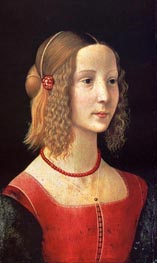
Portait Of A Girl c.1490
Oil Painting
$1820
$1820
Canvas Print
$61.75
$61.75
SKU: GHD-3859
Domenico Ghirlandaio
Original Size: 44 x 29.2 cm
National Gallery, London, UK
Domenico Ghirlandaio
Original Size: 44 x 29.2 cm
National Gallery, London, UK
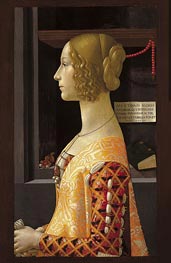
Portrait of Giovanna Tornabuoni 1488
Oil Painting
$2450
$2450
Canvas Print
$61.75
$61.75
SKU: GHD-3860
Domenico Ghirlandaio
Original Size: 77 x 49 cm
Thyssen-Bornemisza Museum, Madrid, Spain
Domenico Ghirlandaio
Original Size: 77 x 49 cm
Thyssen-Bornemisza Museum, Madrid, Spain
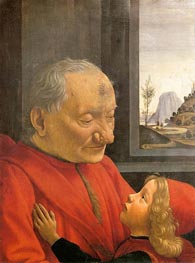
An Old Man and His Grandson c.1490
Oil Painting
$2566
$2566
Canvas Print
$68.92
$68.92
SKU: GHD-3861
Domenico Ghirlandaio
Original Size: 62 x 46 cm
Louvre Museum, Paris, France
Domenico Ghirlandaio
Original Size: 62 x 46 cm
Louvre Museum, Paris, France
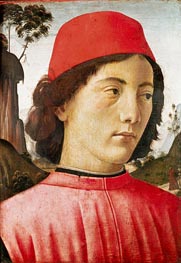
Portrait of a Young Man c.1477/78
Oil Painting
$1741
$1741
SKU: GHD-5542
Domenico Ghirlandaio
Original Size: unknown
Ashmolean Museum, Oxford, UK
Domenico Ghirlandaio
Original Size: unknown
Ashmolean Museum, Oxford, UK
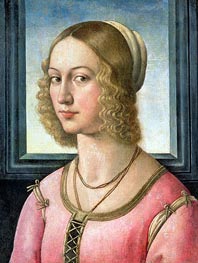
Portrait of Giovanna Tornabuoni c.1485/88
Oil Painting
$2217
$2217
SKU: GHD-5543
Domenico Ghirlandaio
Original Size: unknown
Fuji Art Museum, Tokyo, Japan
Domenico Ghirlandaio
Original Size: unknown
Fuji Art Museum, Tokyo, Japan
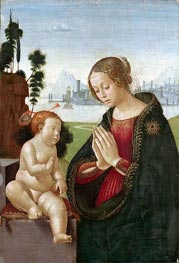
Virgin and Child c.1480/90
Oil Painting
$2425
$2425
SKU: GHD-5544
Domenico Ghirlandaio
Original Size: unknown
Boston Museum of Fine Arts, Massachusetts, USA
Domenico Ghirlandaio
Original Size: unknown
Boston Museum of Fine Arts, Massachusetts, USA
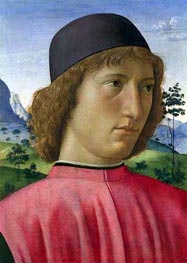
Portrait of a Young Man in Red c.1480/90
Oil Painting
$1741
$1741
Canvas Print
$61.75
$61.75
SKU: GHD-5545
Domenico Ghirlandaio
Original Size: 38.7 x 27.6 cm
National Gallery, London, UK
Domenico Ghirlandaio
Original Size: 38.7 x 27.6 cm
National Gallery, London, UK
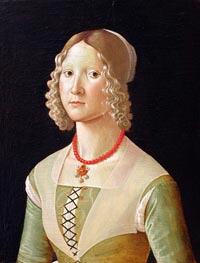
Portrait of a Woman c.1487/88
Oil Painting
$2118
$2118
Canvas Print
$71.80
$71.80
SKU: GHD-5546
Domenico Ghirlandaio
Original Size: 57.2 x 44 cm
Metropolitan Museum of Art, New York, USA
Domenico Ghirlandaio
Original Size: 57.2 x 44 cm
Metropolitan Museum of Art, New York, USA